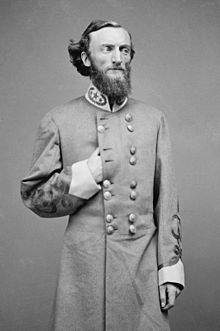John Marmaduke
|
Major General John Sappington Marmaduke |
|
|---|---|
 |
|
| 25th Governor of Missouri | |
|
In office January 12, 1885 – December 28, 1887 |
|
| Lieutenant | Albert P. Morehouse |
| Preceded by | Thomas Theodore Crittenden |
| Succeeded by | Albert P. Morehouse |
| Personal details | |
| Born |
March 14, 1833 near Arrow Rock, Missouri |
| Died | December 28, 1887 (aged 54) Jefferson City, Missouri |
| Resting place | Woodland-Old City Cemetery, Jefferson City |
| Political party | Democratic |
| Father | Meredith Miles Marmaduke |
| Education |
|
| Alma mater | United States Military Academy at West Point |
| Military service | |
| Allegiance | |
| Service/branch | |
| Years of service |
|
| Rank | |
| Commands | 3rd Confederate Infantry Regiment |
| Battles/wars | |
John Sappington Marmaduke (March 14, 1833 – December 28, 1887) was a regular army officer from the divided, border state of Missouri, who became a Confederate major general during the American Civil War.
Serving in Arkansas, he aroused controversy by killing his own commander, Lucius M. Walker, in a duel, and was then accused of murdering black soldiers in the Red River Campaign. During Sterling Price's raid into Missouri, Marmaduke was captured at the Battle of Mine Creek (October 1864) and remained in captivity until the war’s end. He became Governor of Missouri in 1884, successfully campaigning for railroad reform, before dying in office.
The second son among ten children, Marmaduke was born on his father's plantation near Arrow Rock in Saline County, Missouri. His father, Meredith Miles Marmaduke (1791–1864), was the eighth Governor of Missouri. His great-grandfather, John Breathitt, had served as the Governor of Kentucky from 1832–1834, dying in office.
Marmaduke attended Chapel Hill Academy in Lafayette County, Missouri and the Masonic College in Lexington, Missouri, before attending Yale University for two years and then Harvard University for another year.Congressman John S. Phelps appointed Marmaduke to the United States Military Academy, where he graduated in 1857, placed 30th out of 38 students. He briefly served as a second lieutenant in the First United States Mounted Rifleman, before being transferred to the Second United States Cavalry under Col. Albert Sidney Johnston. Marmaduke served in the Utah War and was posted to Camp Floyd in 1858–1860.
...
Wikipedia
